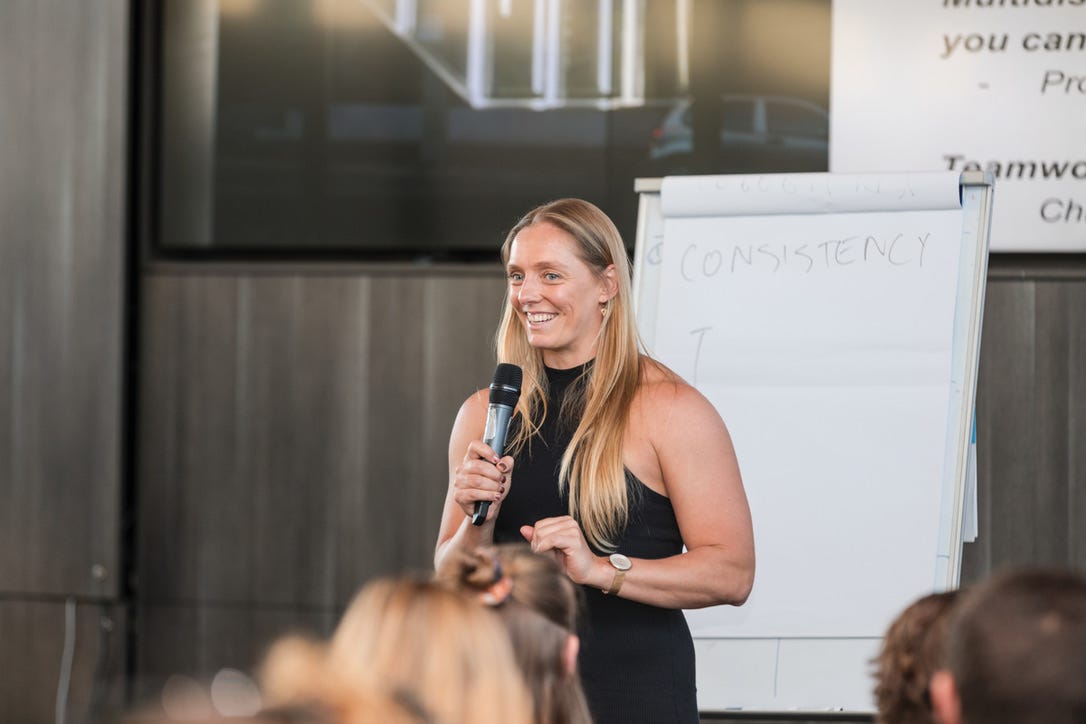Testing commitment
The further we progress in our careers, the more people ask us for help. Do you have an effective filter for deciding who to help? For me, the answer is burpees.
‘Could you write me a workout program?’
As an athlete, it’s a question I get asked all the time.
I used to say yes, and spend hours designing custom workouts for people. And then I realised people weren’t actually doing those workouts.
So I started testing commitment.
‘Could you write me a workout program?’
‘Sure,’ I say.
‘Really? Thank you so much.’
‘What are you training for?’
‘I want to run a 10km race in November,’ is an example of what a friend has told me.
‘Happy to help,’ I say. ‘So that I can write you the best program, I need to benchmark where your fitness is right now. I’m going to give you a test workout, it’s less than 15 minutes. Go and do it this week, tell me your result, and then I’ll write you a program.’
The workout is simple, but brutal. It’s only 2 movements: Burpees (the kind where you lay your chest on the ground, stand up, and jump), and goblet squats (take a 15kg kettlebell, hold it to your chest and squat until your hips are below your knees).
Minute 1: Do 1 burpee, and 1 goblet squat
Minute 2: Do 2 burpees, and 2 goblet squats
Minute 3: Do 3 burpees, and 3 goblet squats
And just keep going in this pattern until you can’t complete all the reps within a minute (I tap out after 15 minutes).
If you’re wondering how many programs I’ve written for people, the answer is…
Zero.
It's a lot easier to ask for a program, than to do a workout.
The tipping point of helping
Early in our careers we’re the ones asking for help. We don’t have a network, resources, experience, or knowledge.
Until one day, we’re experienced enough that other people start asking us. It’s a nice feeling when someone admires you enough to ask for your advice.
As we progress further in our careers, we have more direct reports, more people in our networks, more expertise, more notoriety - so even more people will ask for help.
It can become overwhelming. There is a tipping point where inbound asks exceed the time you have to contribute.
We want to say ‘yes’ and help. And given we all have limited time and energy, we want to focus that help on people who will value, appreciate, and implement the advice we give them.
Testing commitment allows us to identify who those people are.
Ways to test commitment (without burpees)
Asking for help costs nothing. So people will make lots of asks - especially in business. Introductions, advice, feedback, answers, help on a project, mentorship, sponsorship… People you don’t know well will consistently ask for help.
Telling someone to do hundreds of burpees before you’ll help them is fairly extreme. But there are many subtle and polite ways you can test commitment in a professional setting.
Of course, it’s only worth testing commitment if you’re inclined to say yes to helping. If the answer is a straight-up ‘no’, just say it.
Here are some of my favourite approaches:
‘I’d love to meet you for coffee’
Commitment test: ‘What specific question do you think I can help you with?’
Result: 70% of coffee meeting requests can be answered with a quick email instead.
‘Would you be my mentor?’
Commitment test: ‘Write down the goals you think I can help you achieve and email them to me.’
Result: About 50% of the time I either can’t materially help them with their goal, or I can think of a better mentor who can.
‘Can you help me write this blog post?’
Commitment test: ‘Can you share the outline with me?’
Result: Professional writers will have this on hand, amateurs will want you to do the heavy lifting for them. Only work with the professionals.
‘Will you come on my podcast?’
Commitment test: ‘What about my work do you think will resonate with your audience?’
Result: This has helped me decide to say ‘no’ to about 60% of podcast requests due to not being a good fit.
‘I’d love to do work experience at your company’
Commitment test: ‘Here’s a small piece of work you can try as a sample of what we do here’
Result: 70% of people you never hear from again. This is adapted from Thomas Brunskill who built an entire talent startup (Forage) on the principle that companies want to hire motivated students, and they use sample work tasks as a way of testing commitment.
‘Can we have a meeting to help with X problem?’
Commitment test: ‘If you come back to me in 3 weeks, I can find a time then.’
Result: 80% of people will have solved the problem themselves within that time frame.
‘Can you give me feedback on my writing?’
Commitment test: ‘Of course, can you start by highlighting what you think is the best 10% and the worst 10% of your work?’
Result: 80% of people don’t do this. For those who do, it makes giving your feedback much faster. Adapted from Tim Ferriss who sends draft manuscripts with post-its for the 2-10 pages he thinks are most interesting for a person to review.
‘I’d love to hear about how you broke into your role / career?’
Commitment test: ‘I shared my journey in this blog I wrote (or podcast I was on). Read it and come back with the questions I didn’t answer.’
Result: About 15% of people have a specific question they come back with.
‘Can you introduce me to this person?’
Commitment test: ‘Please share a personalised, forwardable email that I can pass on for you’
Result: 90% of people will send the forwardable email, but it saves you a bunch of time writing these introductions.
‘Would you join the board of this organisation?’
Commitment test: ‘Can you show me the skills matrix of the board and what gap you think I’d fill?’
Result: I’ve only been asked this a few times so still too early to tell. A shoutout to Robyn Denholm (Chair of the Tesla board) for this great commitment test question.
‘Can you speak at this conference?’
Commitment test: ‘What is your budget?’
Result: 90% of the time people want you to speak for free. It’s absolutely ok to do that, but you should make sure you get something non-monetary such as photo and video footage, testimonials, or PR instead.
When someone slides into your inbox with an ask, you have no idea if the time you spend helping them will make a material difference.
Commitment tests are a simple answer - a tiny extra step that is a hugely effective filter. I’m constantly astonished by how many people drop out of my inbox once I send a small test.
I’d love to hear what commitment tests you use in the comments section.
And if you’re looking for my help… just send me your workout results!




Great post